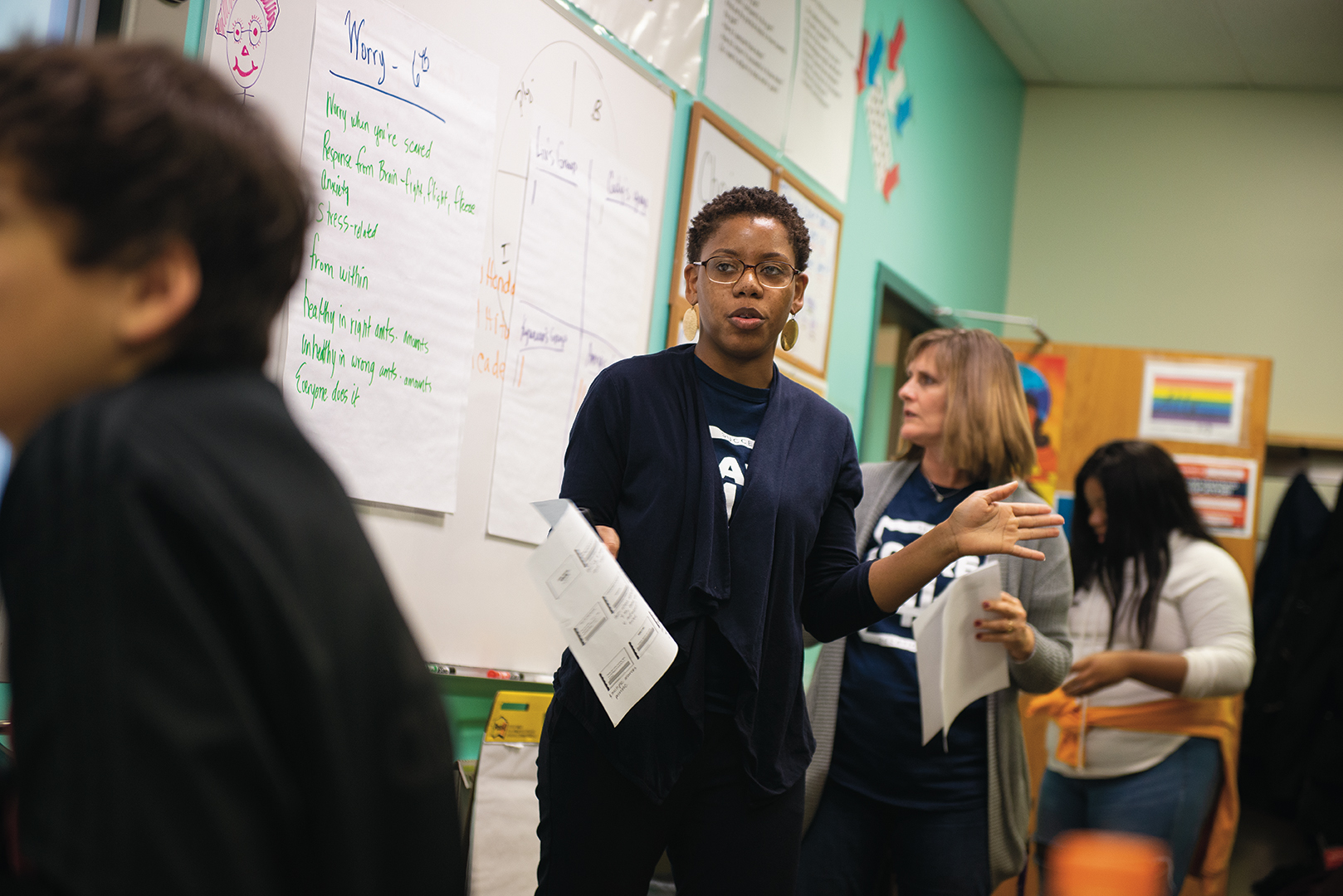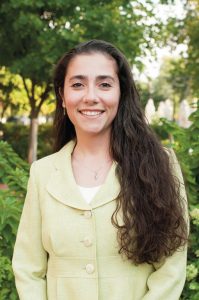Jeremiah Martens’ mother signed him up for a youth development program during his senior year in high school. She said if he didn’t like it, he could quit, but mentioned that it included a free lunch. Jeremiah ended up getting a lot more than a free meal: He improved his communication skills, learned how to read his pay stub, and found his first job.
Jeremiah is benefiting from a program created by Ani Yazedjian, associate provost and University professor in Illinois State’s Department of Family and Consumer Sciences. As a professor in Illinois State’s Department of Family and Consumer Sciences, Yazedjian received a nearly $5.2 million grant from the U.S. Department of Health and Human Services’ Administration for Children and Families to build a curriculum focused on relationship skills, job readiness, and financial literacy. The program is targeted toward at-risk youth between the ages of 15 and 24. She partnered with the Champaign and Urbana school districts to create the Champaign Area Relationship Education for Youth Program (CARE4U) in 2016.
Appears InOffered at no cost to students, the program fills a critical need in Champaign County, where one in five children and youth lives in poverty. CARE4U is offered over two semesters, with the opportunity for 90 hours of summer employment, or a tuition-free community college course after successful completion of the program. More than 30 community partners offer summer jobs designed to match students’ areas of interest, including the fields of athletic training, photography, accounting, state government, and mortuary science.
Jeremiah never had a job before he was placed at the Urbana Library. CARE4U helped him create a resume, which he submitted for an interview and skills testing at the library. He was offered a summer job shelving books and working as a barista. When he enrolled in community college in the fall, the library kept him on. The money he earns is used “mostly for gas,” he said, adding, “I’m going to be real.”
And being real is what this program is all about.
“What we hear from students is they’re exposed to possibilities that they had never thought about,” Yazedjian said. “They are more hopeful as a result of being in the program. They can envision a different future, or a better future, and they have some of the skills that can help them move in that direction. That excites me.”
CARE4U uses Love Notes, a skills-based relationship education curriculum to deliver lessons on healthy relationships and conflict resolution in the fall semester. In the spring semester, the Road to Success curriculum teaches students how to prepare a resume and use a bank account.
“A lot of times our more vulnerable students will say these are not things they’ve been exposed to in their family system,” Yazedjian said.
CARE4U is offered over the lunch hour at multiple sites, including high schools, an alternative school, and a credit recovery program. Project facilitators teach in small groups with the help of Illinois State students and community partners. In 2018, 230 students completed all of the lessons in the program, exceeding the grant’s annual target by 70 graduates.
Michel Maroon is a social worker at Novak Academy in Champaign, a credit recovery program for high schoolers in Champaign. This is her third year working closely with CARE4U, overseeing 15–20 participants each year. Initially she was worried they might drop out, but it’s been the opposite—even students who graduated from high school have returned weekly to complete the program.
“The students are loving the relationship education; that’s the draw,” she said. “A lot of our students struggle with day-to-day life. Most of our students come from disadvantaged backgrounds and a lot of times they’ve been disengaged with the educational system. I feel like they are finally getting it and they’re excited about graduating. When they get involved in these programs and teachers are talking to them and relating to them, all of a sudden it’s, ‘OK, I can do this.’”
Illinois State Psychology Assistant Professors Leandra Parris and Dan Lannin led the continuous quality improvement evaluation team. The research is showing that participants are not only improving their relationships skills but changing some of their life goals.
“Their goals are becoming less materialistic and more geared toward some of the more important things in life like relationships, being a good neighbor, personal growth,” Lannin said. “If students are less materialistic and more intrinsic, they tend to be happier, their relationships tend to be better, and their physical health tends to be better. We’re seeing some of these markers that the life trajectories are slowly starting to shift, which is the whole point of this work.”
Graduate and undergraduate students from multiple disciplines, including psychology, family and consumer sciences, and political science, assist in data collection and analysis. Students conduct focus groups and collect quantitative and qualitative data with a pretest, three posttests, and a six-month follow-up survey.
Measuring and sharing outcomes are critical to duplicating the success of CARE4U, Yazedjian said. When barriers are identified—such as the resistance students sometimes find when practicing their new skills at home or with their romantic partners—they can be dealt with and changes made.
For example, Yazedjian developed family nights, with students inviting relatives and partners to learn more about the CARE4U concepts. She found that when families have a better understanding of their students’ new skills, family support grows and students are more likely to complete the program.
“That’s one of the ways our data has informed our practice,” she said.
Keeley Hines ’17 became involved in the research as a psychology undergraduate, and is now pursuing a graduate degree in school psychology. She facilitates groups, combs through data, prepares research proposals, and presents at conferences on how school climate (which is how students feel in their environment) is influenced by the program.
“They are more hopeful as a result of being in the program. They can envision a different future, or a better future, and they have some of the skills that can help them move in that direction. That excites me.”—Ani Yazedjian
“One of our measures is readiness to change. After our program, they are ready to use those skills to make progress. Our hope would be if they believe that it can get better, that they’ll get that job, or can get into college, that it’ll make a difference.”
Results have been disseminated through 19 presentations at several national conferences, including the American Association for Family and Consumer Sciences, the National Council on Family Relations, the American Psychological Association, the American Association of Colleges and Universities, and the National Association of School Psychologists. Several of these presentations have included undergraduate and graduate students as co-authors.
“We’re taking what we’re learning from our program and giving it back to the practitioners,” Yazedjian said. “That’s really what excites me as a scholar—not just writing an article that contributes to the literature but to have something that both builds the body of knowledge in our field but also impacts practice. That’s what sets us apart.”
Schools and community partners are asked to explore ways to sustain the program when federal funding ends. The Urbana school district is paying teachers to co-facilitate so they can learn the curriculum.
Novak Academy will be able to continue the program because of the close relationship with the CARE4U staff, Maroon said.
“That’s been the cool thing. Even if the grant goes away, we still have this program we can share with our kids,” she said. “Every year it just gets better and better. I’m so thankful that they came to Champaign. Everyone looks forward to them coming into the building. It’s like they’re part of our staff.”
Yazedjian is excited about the potential for this research to inform best practices for working with youth in lower income, ethnically diverse populations.“
“It gives me the opportunity to take what we know from research and apply it in the real-world setting in a way that’s going to make a difference in people’s lives.”
Kate Arthur can be reached at kaarthu@IllinoisState.edu.


